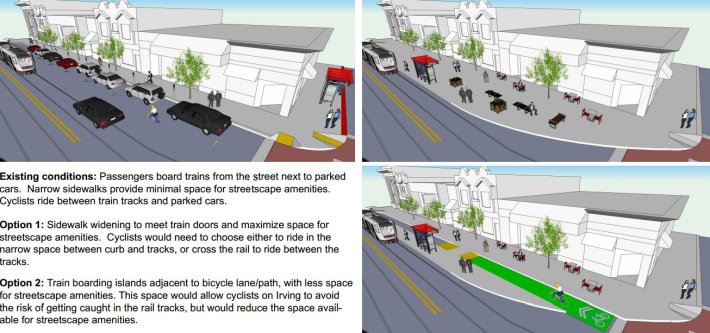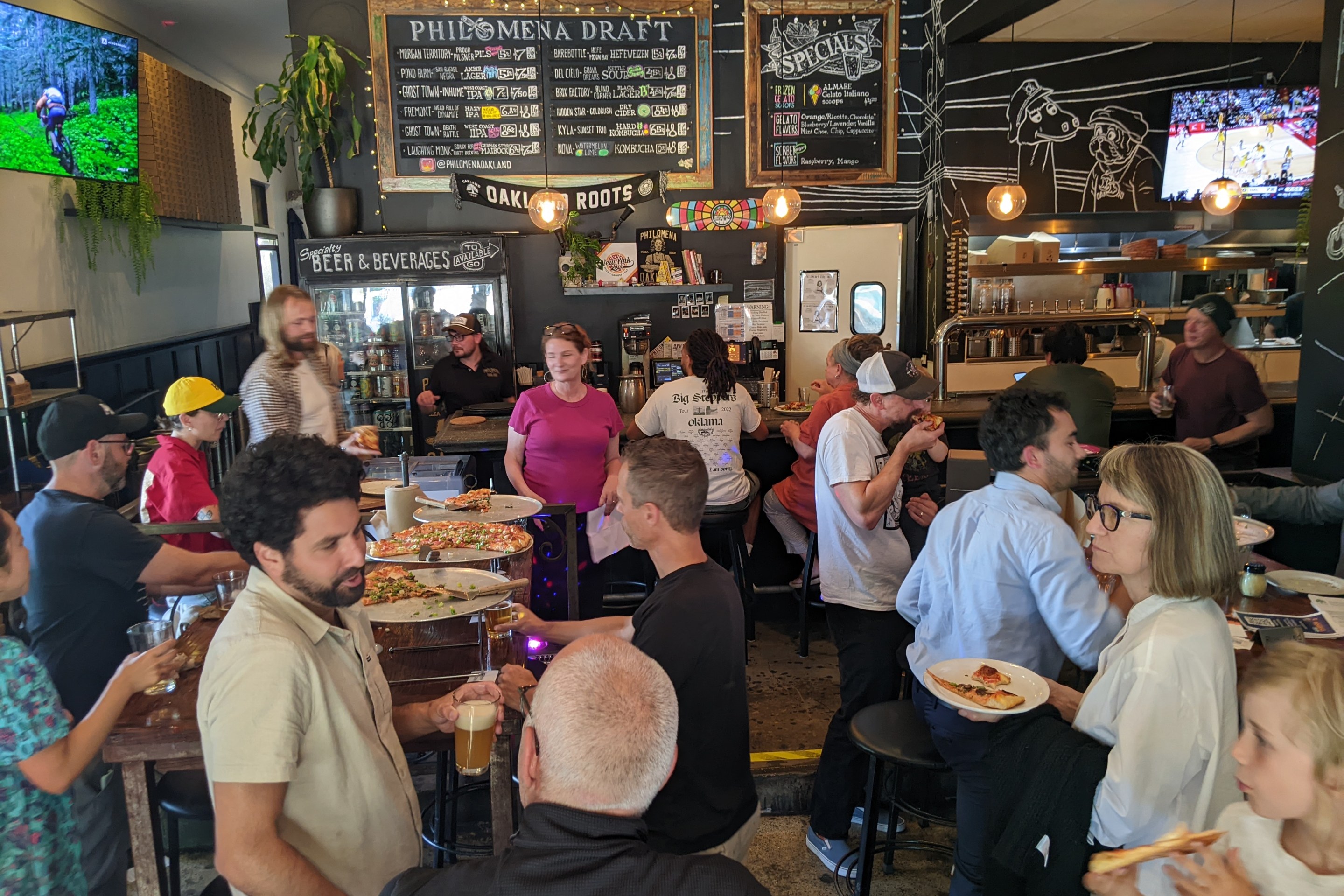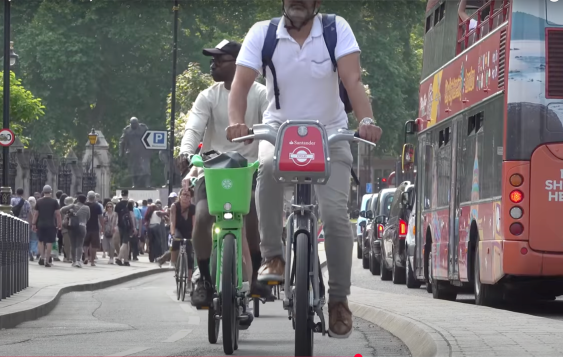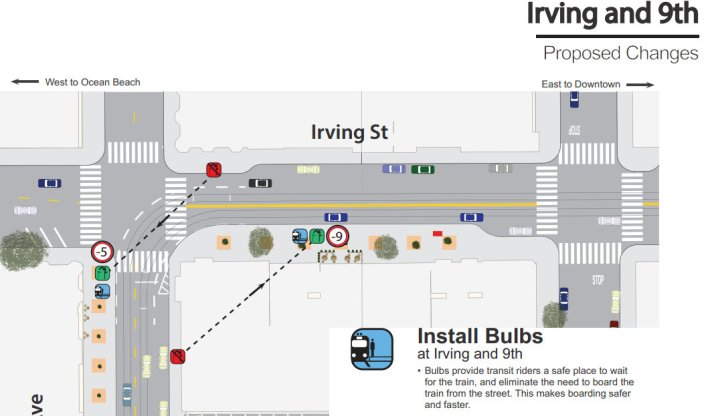
When it comes to gauging support for changes on our streets, it's easy to get the impression at community meetings that a handful of vocal critics represent significant opposition. But as preliminary survey results from a recent Inner Sunset meeting on improvements for the N-Judah show, public forums can often be a poor reflection of the actual level of community support for re-allocating street space to improve transit, walking, and biking.

At a meeting about the N-Judah two weeks ago, planners for the Transit Effectiveness Project fielded input on route adjustments and other measures to speed up Muni service, like transit bulbs, new transit-priority traffic signals, and stop consolidation.
Having attended most of the SFMTA's community planning meetings over the past three years, I've noticed a strong pattern: While a handful of people may scream about project proposals in a public forum, that doesn't mean they represent their neighbors.
During the Q&A portion of the N-Judah meeting, the usual dynamic played out. Complainers dominated. Fear of change seemed to permeate the room.
But in the survey filled out by people at the same meeting, most respondents supported the boldest proposals [PDF]. Actual public sentiment was in favor of change. The pro-reform contingent was just less vocal during the Q&A.
Not that planning decisions that make streets safer and improve service for thousands of transit riders should come down to a vote. But too often, city agencies cave to the loudest people in the room and water down proposals in a misguided bid to appease critics. The N-Judah meeting showed that the angry people may command the most attention, but that doesn't mean they're representative of public sentiment.
Take the Polk Street redesign, which the SFMTA watered down last year to appease merchants who fiercely oppose any removal of parking for protected bike lanes and sidewalk extensions. As it turns out, a recent survey of people who live, work and shop on Polk showed that safety for people walking and biking is a far greater concern than the supply of car storage.
So what were the survey numbers on the N-Judah improvements? According to 101 responses at the meeting:
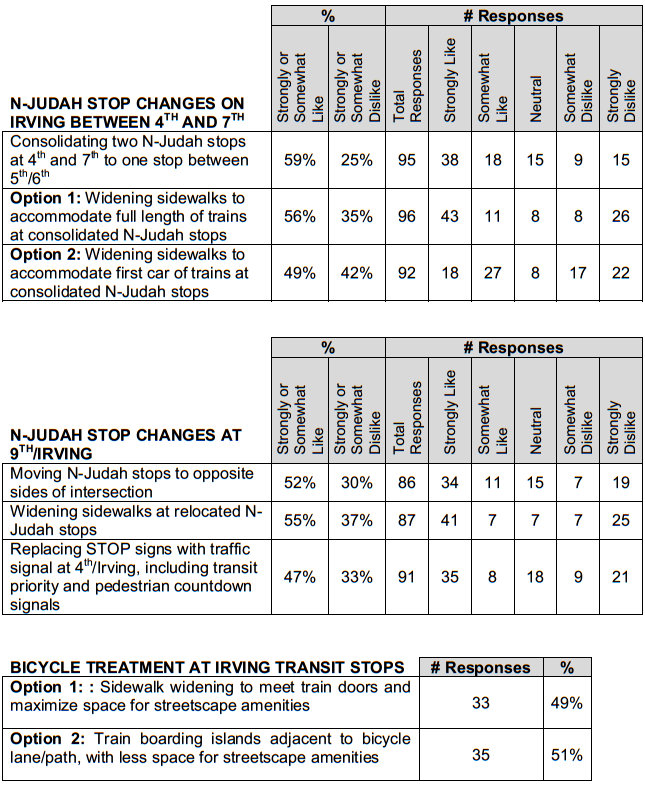
Even on that last item, the bolder option (transit stops with a bike lane between the sidewalk and boarding island -- similar to the configuration at Duboce Avenue and Church Street) was favored by a narrow majority. It's still a pretty new arrangement to SF, and some people are still uneasy about crossing a bike lane (even though we have plenty of boarding islands where we must cross traffic lanes for cars). But since Irving is the most practical bike route through the neighborhood, and where the businesses are, it's crucial to implement this design, or else people on bikes would be forced to ride on the rail tracks. The issue didn't come up in the Q&A session.
Now, to address a few of the concerns that did come up during the Q&A. One woman insisted that the proposed sidewalk extensions would somehow add to traffic congestion, even though the space would come from parking spaces and excess road width mostly used for double parking. One man, of course, complained about the loss of 30 parking spaces for the benefit of tens of thousands of N-Judah riders. Another woman who lives on Irving between 5th and 6th Avenues, where the new consolidated N stops would be, said she feared noise from waiting Muni riders. But any such problems would already exist at the stops one block over, and they're pretty quiet.
One man also voiced a more reasonable concern about the movement of an outbound N stop on Irving at Ninth, before the stop light, to southbound Ninth, after the train makes a left turn. The 44-O'Shaughnessy, which runs on Ninth, already stops there, and the man said he thinks the 44 would get backed up behind a stopped train. SFMTA planners said the transit bulb would be long enough for both the 44 and a two-car N train to stop and load, but drivers could theoretically still be caught between the two, and would have to avoid blocking the intersection while Muni vehicles are stopped. (By the way, the Arizmendi parklet on Ninth would be replaced by the transit bulb.)
Fortunately, the SFMTA, DPW, and Planning Department do seem to be taking more surveys and moving away from meetings structured mainly around Q&As, which tend to get co-opted by whoever can take the floor the longest, often voicing irrational or irrelevant comments. The format of the N-Judah meeting was an open house with boards and staffers explaining the proposals and fielding questions and comments, with a presentation and limited Q&A session in the middle.
It's important to keep in mind that the format of those Q&A sessions is biased toward opposition. City staffers usually set it aside for clarifying questions, but more often than not, it's an opportunity for critics to get on a soapbox. Meanwhile, as the N-Judah surveys show, supporters of the proposals tend to stay quiet as they wait for the meeting to move along.
As you attend the Muni TEP meetings (and public planning meetings) going forward, it's important not to let your impression of community support be based on whoever's yelling the loudest, and, of course, take the surveys.
The SFMTA's survey about the N-Judah Irving improvements is still open online. And the TEP meetings are just getting started. Below is the schedule for the rest of the round.
Tuesday, February 18, 6-8pm
Park Branch Library Meeting Room, 1833 Page Street
Routes: 6, 71
Wednesday, February 19, 6-8pm
Scottish Rite Temple, 2850 19th Avenue
Routes: 28, 28L
Saturday, February 22, 11am-1pm
Visitacion Valley Elementary School, 55 Schwerin Street
Routes: 8X, 10, 22, 33, 56
Monday, February 24, 6-8pm
Mission Rec Center, 2450 Harrison Street
Routes: 10, 12, 22, 27, 33
Tuesday, February 25, 6-8pm
San Francisco State University, Seven Hills Conference Center, 800 Font Boulevard
Routes: 17, 18, 28, 28L, 36, 43
Wednesday, February 26, 6-8pm
Bayanihan Community Center, 1010 Mission Street
Routes: 10, 12, 22, 27, 33
Saturday, March 1, 1-3pm
Telegraph Hill Neighborhood Center, 660 Lombard Street
Routes: 8X, 11, 27, 47, 76
Monday, March 3, 6-8pm
LGBT Community Center, 1800 Market Street
Routes: 35, 48
Wednesday, March 5, 6-8pm
Calvary Presbyterian Church, 2515 Fillmore Street
Routes: 3, 28, 28L, 43
Thursday, March 6, 6-8pm
SFMTA Atrium, 2nd Floor, One South Van Ness Avenue
Routes: Citywide meeting
Saturday, March 8, 10am – Noon
SFMTA Atrium, 2nd Floor, One South Van Ness Avenue
Routes: Citywide meeting
